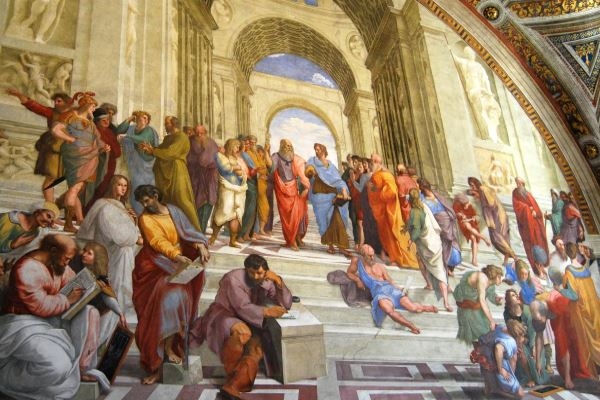By Robert Hand, MA
Plato, Especially with Respect to Astrology.
We first see evidence of applications of philosophical principles that could be relevant to astrology in the writings of Plato (.428 – .327 BCE). We may also see them in the fragments left by the Pythagoreans, but recent scholarly work has questioned the antiquity of these fragments such that they may be after Plato rather than before him. So we will start with Plato who, in any case, was strongly connected with the Pythagorean tradition whatever it may have consisted of in these early days.
In Plato’s writings we see two themes that are important to the development of a philosophical or religious astrology, his idealism, and his philosophy of astronomy and religion. Both of these are part of the foundation of any system of esoteric astrology all the way up to and including modern, theosophical, esoteric astrology.
“Idealism” as applied to Plato and to philosophers in general does not refer to “ideals” in the modern ordinary language sense, such as when we call someone an “idealist.” Rather it refers to a philosophical principle which holds that ultimate reality, that which truly exists and consists of eternally true principles, does not lie in the visible or material world of the senses, but consists of realities that are accessible only to the intellect (the intelligible) even though they are the source of patterns, forms, and the shapes of things accessible to the senses (the sensible) in the physical. To an idealist Mind (not limited to one person’s mind, but Mind in general) and what it can perceive is more real than what we seem to perceive in the physical world. And an aspect of Plato’s idealism was that anything that behaves according to mathematical principles and seems to be governed by law must be closer to the “real” than things which do not.
The ancients noticed that stellar motions, especially those of the “wandering stars” (known to us as planets) behaved according to mathematically describable patterns. This made it clear to them that these entities were not only “higher” in the literal sense of being far from the center of the earth, but were also higher in the scale of existence because they behaved more according to mathematical principles than the apparently crazy, unpredictable events of the physical world on earth. Thus planets and stars were closer to the divine, and more “real”, because they were comprehensible to intellect, than things on earth and whatever had to do with matter. The important duality implicit in all of this is the duality of inner versus outer, that which exists inside of Mind versus that which exists outside of Mind and is perceptible by the senses. Note that this is precisely the esoteric versus exoteric split. Plato’s philosophy gave priority to Mind over Nature.
Now when we say ‘mind’ here, we have to understand that this is mind removed, or “purified,” from all influences arising from the body, from material concerns, from emotions and instincts. It is in the true sense of the word rational mind. What Plato and other ancients meant by ‘rational’ may not be, and usually was not, what modern authors mean by rational because in modern times the word and concept ‘rational’ has been hijacked by one particular philosophical school which has defined ‘rational’ according to its precepts and all other forms of rationality are declared irrational. Plato’s and the general ancient conception of rationality was much broader than ours. According to modern rationality astrology is irrational; according to Plato and the ancients it was not.
To sum up, with Plato “reality” lived in Mind, not in individual mind, but Mind as a whole. The stars and planets, which moved according to rational principles, were more real and therefore more divine. Observing or contemplating the heavens put one in touch with the divine. In a very real sense, Plato’s philosophy is the foundation of all forms of esoteric astrology.
The Contributions of Aristotle to the Metaphysical Foundations of Astrology.
After Plato the next eminent philosopher was Aristotle (384 BCE – March 7, 322 BCE) who is generally believed to be one of Plato’s students and also was the principal tutor to Alexander the Great. As stated in last week’s introduction, Aristotle’s philosophy as it influenced astrology is the foundation of what became exoteric astrology. Although Aristotle’s philosophy does contain many of the basic elements of Plato’s philosophy, in many respects Aristotle turned Plato’s philosophy on its head. Where Plato emphasized the reality of the intelligible over the sensible, Aristotle did nearly the opposite emphasizing the need to gain information from the senses properly instructed over the contents of the mind. Both philosophers stressed the importance of the dichotomy of matter and form, but while Plato taught that the realm of forms was the true reality and that the outer world of the senses was merely a set of copies, often quite corrupt, of the world of form, Aristotle saw form as nonexistent outside of its manifestation in the world.
Or, more precisely, he saw form as existing in actuality in combination with the matter of which it was constituted. The combination of some matter with an appropriate form constituted a real object in the world. Form could also exist potentially, that is, in a state where it could manifest, but was not yet in fact manifest. These views of Aristotle’s are still the dominant views of contemporary philosophy of science for, although Aristotle’s philosophy of nature was overthrown in the early modern period during the scientific revolution, his overall viewpoint about knowledge and reality is still the norm. Reality exists in the outer world outside of mind.
For the metaphysical foundations of astrology there are four facets of his philosophy that are particularly relevant. The first is his idea, expressed in the Metaphysics (see the passage from the Metaphysics in Passages from Aristotle and the Stoics) that the end or purpose of all change is contained in the movements of the heavenly bodies.
Second, is his doctrine of the four elements now mostly enshrined in the astrological triplicities, but originally much more important in traditional astrology. This doctrine is reasonably well known in modern astrology and we will not take it up here because it is part of Aristotle’s natural philosophy and, while historically important, does not have much impact on the metaphysics of astrology.
The third is more important to the metaphysics of astrology and that is his doctrine of the four causes, to wit, the material cause – that out of which something is made; the formal cause – what a thing is, its essence; the efficient cause – that which makes something move, change, or come to be; and its final cause – that for the sake of which something comes into existence, its purpose, its end. These are discussed at length in the passage from Ross’s book in Passages from Aristotle and the Stoics. The importance of these for astrology is not generally recognized by modern astrologers, but Aristotle’s doctrine of causation is extremely relevant to the task of freeing astrology from the shackles of mechanistic thought. In particular the final cause has been explicitly banned from modern philosophy and science because it particularly asserts both meaning and intent within the cosmos, two ideas that mechanist-materialist philosophy cannot accept, but which astrology does accept.
The fourth facet is Aristotle’s material on the soul. First, he defines soul as that which makes a body a living body, then he characterizes the three levels of soul which became the basis of medieval astrological psychology (yes, there is such a thing), and which survives to this day in a somewhat altered form as Jung’s three levels of the mind as the conscious mind, the personal unconscious, and the collective unconscious. In addition Aristotle characterizes the soul as not only the formal cause of a living body, but the final and efficient causes as well. Again see the material contained in Passages from Aristotle and the Stoics. All of these are relevant not only the metaphysical foundations of astrology but to practical astrology as well.
Granted that Aristotle’s philosophy does not contain the same kind of rich spiritual and metaphysical implications that Plato’s does, why is his philosophy important for our discussion? Even the philosophers of the middle ages from the 12th century forward, who were much more profoundly influenced by Aristotle than Plato, agreed that Plato’s metaphysical philosophy was more profound than Aristotle’s. Aristotle is important to us not only because of the facts that I have already pointed out, but because later philosophy “married” Plato and Aristotle to the best of its ability, throwing out those few aspects of Aristotle that it deemed problematical, and synthesizing the two philosophers by creating a radically new view of the created universe that lies at the center of all western esotericism from their day to this. These were the Neoplatonists whom we will take up in a couple of weeks. Neoplatonism influenced subsequent philosophy to such an extent that until the Renaissance almost all followers of Aristotle were more or less Neoplatonists as well, some leaning more toward the Platonic end of the spectrum (the philosophers of the high and later middle ages) and others to the Platonic end (most of the late classical commentators on Aristotle as well as the major Arabic ones).
Definitions
‘Esoteric’ — Derived from Greek esoterikos and esoterô meaning ‘inner’ or more deeply inward. “Of philosophical doctrines, treatises, modes of speech, etc.: Designed for, or appropriate to, an inner circle of advanced or privileged disciples; communicated to, or intelligible by, the initiated exclusively. Hence of disciples: Belonging to the inner circle, admitted to the esoteric teaching. Opposed to EXOTERIC.” – Oxford English Dictionary.
‘Exoteric’ — Derived from Greek exoterikos and exoterô meaning ‘outer’. “Of philosophical doctrines, treatises, modes of speech, etc.: Designed for or suitable to the generality of disciples; communicated to outsiders, intelligible to the public. Hence of disciples, etc.: Belonging to the outer circle; not admitted to the esoteric teaching. Of an author: Dealing with ordinary topics; commonplace, simple.” – Oxford English Dictionary.
‘Theosophy’ — “1. Any system of speculation which bases the knowledge of nature upon that of the divine nature: often with reference to such authors as those above mentioned, and more particularly to Boehme.
(c) 2010 Robert Hand



